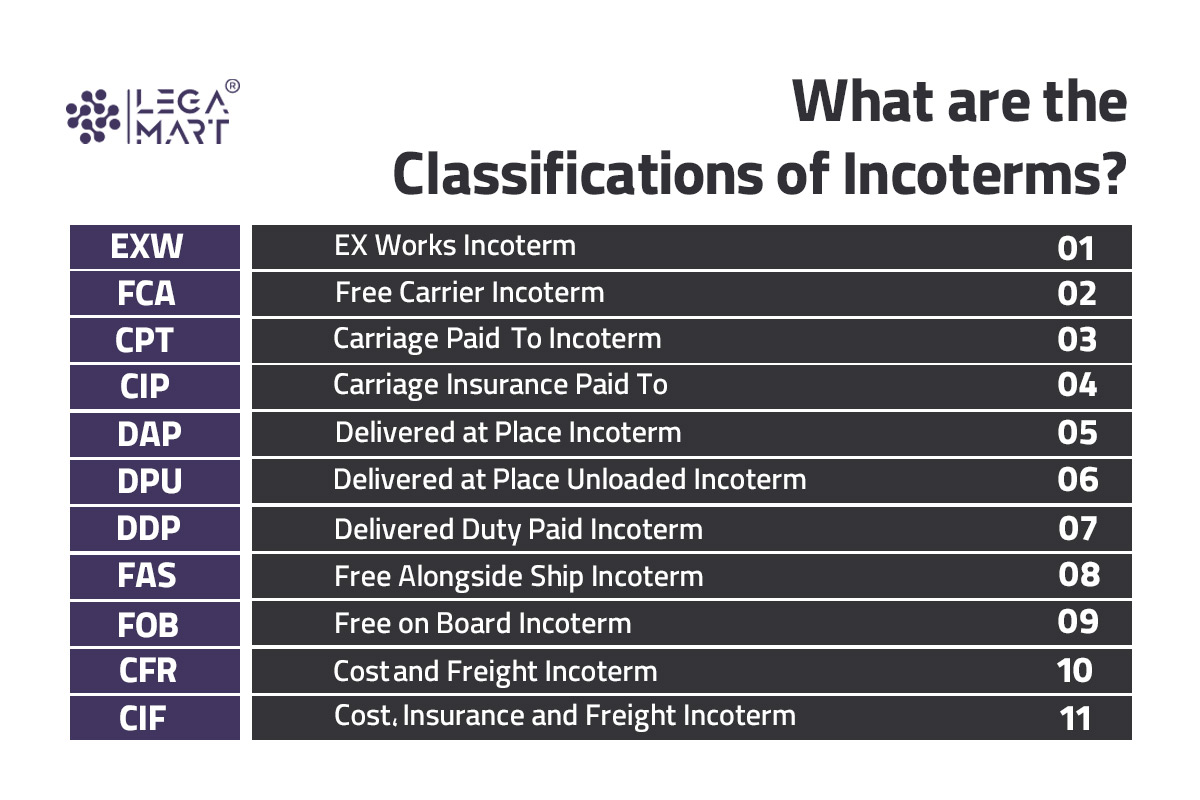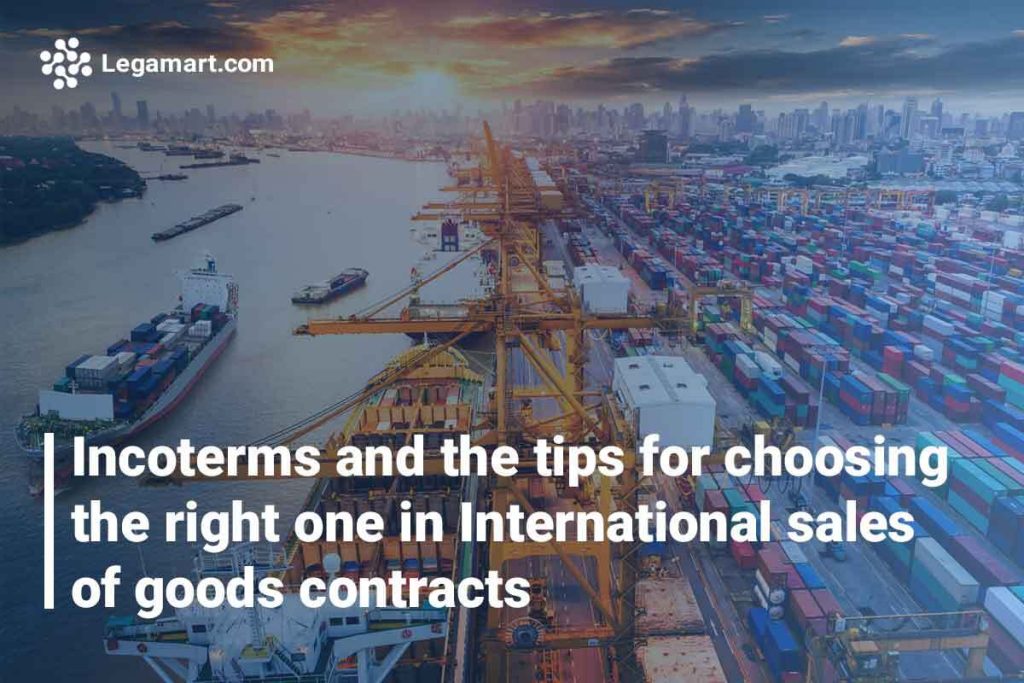- Introduction
- What are Incoterms in International Trade?
- History of Incoterms
- What are the Classifications of Incoterms?
- EX Works Incoterm (EXW)
- Free Carrier Incoterm (FCA)
- Carriage Paid To Incoterm (CPT)
- Carriage Insurance Paid To (CIP)
- Delivered at Place Incoterm (DAP)
- Delivered at Place Unloaded Incoterm (DPU):
- Delivered Duty Paid Incoterm (DDP)
- Free Alongside Ship Incoterm (FAS)
- Free on Board Incoterm (FOB)
- Cost and Freight Incoterm (CFR)
- Cost, Insurance and Freight Incoterm (CIF)
- What are the Tips for Choosing the Right Incoterms?
- Importance of Choosing the Right Incoterm
- Conclusion
Introduction
Terms stating the duties of parties is a vital part of the International sales of goods contract. Trade terms on licensing, customs clearance, shipments, and risk division are necessary. They remove disputes and legal disagreements in International sales of goods contracts.
The International Chamber of Commerce (ICC) put in place a set of rules known as Incoterms. Incoterms are for interpreting International trade terms. They clarify the duties of parties and make for seamless International sales of goods contracts.
This article will discuss Incoterms and tips for choosing the right incoterms.
What are Incoterms in International Trade?
The word “Incoterm” is an abbreviation for International Commercial Terms. Incoterms outline the parties’ responsibilities under a contract for international sales of goods.
Incoterms are voluntary and recognized globally. Parties must input Incoterms into their contracts to have legal effect as they are not mandatory.
Incoterms, a set of eleven rules, was established in 1936 by the ICC. From time to time, the ICC revises and updates the Incoterms rules. The reviews are to ensure that Incoterms meet international trade standards.
History of Incoterms
Various countries have varying policies and procedures governing International sales of goods contracts. Thus, there was a need for a uniform set of rules to regulate International trade contracts. This need birthed the publication of Incoterms in 1938.
Incoterms were first introduced in 1931 though the ICC published them in 1938. Over time, Incoterms have evolved into international trade clauses recognized globally.
The ICC reviews the International commercial terms after every ten years. The first revision of the incoterm was in 1953. The next updates were in 1967, 1976, 1980, 1990, 2000, 2010, and 2020.
What are the Classifications of Incoterms?

Incoterms consist of 11 rules, of which seven apply to all modes of transportation and four apply to sea and inland waterway transport.
Incoterms that relate to all modes of transport are:
EX Works Incoterm (EXW)
Under the EXW Incoterm, more responsibility is on the buyer. The seller is only required to deliver the goods at a place named by the buyer. The seller only bears the risk of loss until the goods get delivered to the buyer.
Free Carrier Incoterm (FCA)
Free carrier Incoterms places more duty on the seller. The seller must deliver the goods to a carrier or location stated by the buyer. Under an International sales of goods contract, it is the seller’s duty to clear the goods for export. Here, the seller has no further obligation once the goods are delivered.
Carriage Paid To Incoterm (CPT)
Here, it is the seller’s responsibility to transport the goods to a named destination. Yet, it is not the seller’s duty to insure the goods.
Carriage Insurance Paid To (CIP)
This incoterm is like the CPT Incoterm. Unlike under the CPT Incoterm, the seller is responsible for insuring the goods.
Delivered at Place Incoterm (DAP)
It is the seller’s duty under a DAP Incoterm to deliver the goods at the destination. It is not the seller’s duty to unload the goods at their destination.
Delivered at Place Unloaded Incoterm (DPU)
This incoterm is a new feature of the 2020 Incoterms. It replaced the Delivered at Terminal (DAT) Incoterm of 2010. A DPU stipulates that the seller is liable for goods until they reach the place of destination and are unloaded.
Delivered Duty Paid Incoterm (DDP)
The DDP Incoterm places the highest risk on the seller. The seller covers the cost and risk till the goods arrive at the buyer’s place of destination.
Incoterms that relate to sea and Inland waterway transport are:
Free Alongside Ship Incoterm (FAS)
Under the FAS, the seller bears the risk until the goods dock alongside a vessel nominated by the buyer. It is the seller’s responsibility to clear the goods for export. The seller bears the risk of the goods from the port of shipment and clears the goods for import.
Free on Board Incoterm (FOB)
As per this trade term, the seller is responsible for the goods until they reach the buyer’s vessel. The risk lies with the buyer once the goods are loaded onto the vessel.
Cost and Freight Incoterm (CFR)
Here, the risk transfers from the seller to the buyer at the delivery port. Yet, the seller bears the cost and freight of delivering the goods to the destination.
Cost, Insurance and Freight Incoterm (CIF)
Under this trade term, risk transfer occurs at the delivery port. The seller takes responsibility for the shipment until the goods arrive at the destination. The insurance is as agreed by the parties in their agreement.
What are the Tips for Choosing the Right Incoterms?
When it comes to international sales of goods contracts, it is not enough to use an Incoterm, it is also crucial to use the right one. There are some factors to consider when selecting an Incoterm for a sales contract.
Here are some factors to consider and tips for choosing the right Incoterms:
Whether an Incoterm is More Suitable for Importation or Exportation
An incoterm like Ex Works is suitable for Exporters. Here, sellers fulfill their duty when the goods are ready for pick up from their facility. FAS, FCA and FOB Incoterms, can also be good options for exporters.
DAP, DUP, and DDP Incoterms are the preferred options for importers. These terms put importers in charge of customs formalities when the goods arrive. They are also responsible for inland transportation to the destination and unloading.
Mode of Transportation
Some Incoterms are only appropriate for a specific mode of transportation, for example, sea freight. Other International commercial terms apply to any method of transportation. Incoterms like FAS, FOB, CFR, or CIF are for sea and inland water transport.
For Air freight, EXW, CIP, CPT, DDP, and DAP incoterms may be the right incoterm. Choosing the right incoterm that favors the mode of transportation will prevent delays.
Types of Goods
One must consider the nature of goods under an International sales of goods contract. Some incoterms are best for goods that need immediate delivery, and others are not. Also, for out-of-gauge cargoes (OOG) that cannot fit into a container, FAS Incoterm will be the best incoterm.
Level of experience of the parties
In choosing the right incoterm, buyers and sellers must consider their experience level. For example, EXW Incoterm is not suitable for importers. A buyer with more experience importing goods can decide on Ex Works Incoterm.
DAP, DDP, and DPU Incoterms are good for importers with little experience.
Control Over the Goods, Operations, and Cost
Incoterms like CPT and CIP do not give the importer control over the operation and cost. The importer takes responsibility for the goods arriving at the destination. But in Incoterms like Ex Works, the importer has more control over the goods than the seller.
Relationship Between the Seller and Buyer
Some incoterms are suitable when one party knows little about the other party. Terms like FAS, FOB, and FCA make sense for an importer with little knowledge of the seller. It will ensure that the importer controls the cost and logistic chain of the goods from the point of loading until the destination.
Insurance Policies
It is necessary to insure the goods against any form of damage. Parties must consider insurance policy and whose responsibility it is to insure goods. They must choose the right incoterm accordingly. In CIF incoterm, the seller must insure the goods against damage or loss. Under CPT Incoterm, the buyer has no duty to insure the goods. Find out more about shipping insurance in this LegaMart article.
Importance of Choosing the Right Incoterm
The importance of choosing the right incoterm cannot be overstated. Here are some advantages of selecting the right International Commercial terms:
- Using inappropriate incoterm might result in the inability to comply with such incoterm.
- Choosing the right incoterm for an International sales of goods contract gives certainty to the contract. It helps the parties know their duties and responsibilities under the contract.
- It eliminates exigencies and increases logistics and complications.
- The right terms in a sales contract ensure that goods and services are paid on time.
- The right incoterm protects all parties to the International sales of goods contract.
- An Incoterm determines the document required for a shipment. Thus, it is best to choose the right incoterm to provide the documents needed for an International sales of goods contract.
Conclusion
It is vital to research each incoterm to know the most suitable before using any. Choosing the right incoterm is critical in ensuring a smooth sales contract. This work has not only provided tips in choosing the right incoterms. It has also given an overview of the eleven International commercial terms. Though Incoterms are voluntary, there is no gainsaying that incoterms make for a seamless sales contract. Parties to a sales contract must pay attention to these tips for choosing right incoterms.




